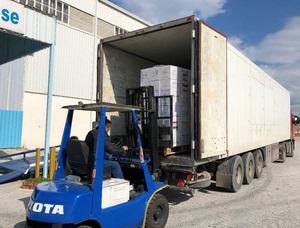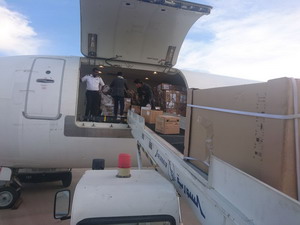WHO delivers life-saving health supplies to Deir-ez-Zor governorate
 7 February 2018 - The World Health Organization (WHO) dispatched 14 tons of life-saving medicines, anesthetics, antibiotics, emergency medical kits and other treatments to Deir-ez-Zor governorate this week to urgently respond to the critical health needs of people in north-east Syria. The shipment contains more than 303 000 treatments for ill and wounded children, women and men.
7 February 2018 - The World Health Organization (WHO) dispatched 14 tons of life-saving medicines, anesthetics, antibiotics, emergency medical kits and other treatments to Deir-ez-Zor governorate this week to urgently respond to the critical health needs of people in north-east Syria. The shipment contains more than 303 000 treatments for ill and wounded children, women and men.
Many Syrians who have recently returned to Deir-ez-Zor have found that their homes have been damaged or destroyed, and that health care facilities in the area are closed or are only partially functioning. Recent assessments indicate that more than 40% of the governorate’s hospitals and primary health centres were forced to close following heightened conflict in 2017.
17 tons of medical supplies airlifted to Al-Hasakeh governorate in northeast Syria
 6 February, 2018- The World Health Organization (WHO) has airlifted 17 tons of medical supplies to Al-Hasakeh governorate, Syrian Arab Republic, as part of its continued efforts to alleviate the suffering of hundreds of thousands of internally displaced people (IDPs) and critically ill patients in north-east Syria.
6 February, 2018- The World Health Organization (WHO) has airlifted 17 tons of medical supplies to Al-Hasakeh governorate, Syrian Arab Republic, as part of its continued efforts to alleviate the suffering of hundreds of thousands of internally displaced people (IDPs) and critically ill patients in north-east Syria.
The airlift contains enough supplies to treat at least 380 000 people, including those wounded as a result of the ongoing conflict.
The provision of these critically-needed medical supplies is part of WHO’s commitment to boosting the health system in north-east Syria by donating life-saving medicines and essential equipment to overstretched health care facilities in Al-Hasakeh, Rural Ar-Raqqa and Rural Deir-ez-Zor governorates.
WHO ensures life-saving treatment for cancer patients in Syria with support from Kuwait
 Hamad receives a gift package from WHO on World Cancer Day. Hamad has to come to the hospital for 5 days every 3 months to be treated for leukemia. WHO/Syria5 February 2018 – Thirteen-year old Hamad from rural Hama, Syrian Arab Republic, is being treated for leukaemia at the Children’s Hospital in Damascus. On Sunday 4 February, he met Elizabeth Hoff, the WHO Representative in Syria, when she visited the hospital on the occasion of World Cancer Day. He and the other children in the ward received a gift package that included a school bag, colouring book and other items. “Thank you for the bag, I will use it when I go back to school”, said Hamad. “I want to study hard and become a neurosurgeon when I grow up.”
Hamad receives a gift package from WHO on World Cancer Day. Hamad has to come to the hospital for 5 days every 3 months to be treated for leukemia. WHO/Syria5 February 2018 – Thirteen-year old Hamad from rural Hama, Syrian Arab Republic, is being treated for leukaemia at the Children’s Hospital in Damascus. On Sunday 4 February, he met Elizabeth Hoff, the WHO Representative in Syria, when she visited the hospital on the occasion of World Cancer Day. He and the other children in the ward received a gift package that included a school bag, colouring book and other items. “Thank you for the bag, I will use it when I go back to school”, said Hamad. “I want to study hard and become a neurosurgeon when I grow up.”
“Thanks to a generous new donation from Kuwait, WHO will be able to cover the cost of treating children like Hamad who suffer from cancer. This US$1 million grant will be enough to provide over 7 months’ treatment for the approximately 1500 cancer patients admitted each year to the Children’s Hospital,” said Ms Hoff.
Medicine on the move
WHO ramps up health support to camps in northeastern Syria in response to huge population movements
 A boy plays with a homemade kite in Ain Issa Camp31 January 2018 – Sitting on the uneven floor of his small white tent in a displacement camp in northeastern Syria, Nasser Ali Mousa can find only one way to describe what his family went through in Raqqa during years of ISIL occupation and in the fierce battle to dislodge the group from the city.
A boy plays with a homemade kite in Ain Issa Camp31 January 2018 – Sitting on the uneven floor of his small white tent in a displacement camp in northeastern Syria, Nasser Ali Mousa can find only one way to describe what his family went through in Raqqa during years of ISIL occupation and in the fierce battle to dislodge the group from the city.
“It was hell,” he says.
He looks at his grandson, Ra’ad, playing with a cherub-faced friend from the tent next-door. Ra’ad is wearing thick grey pants and a batman sweater.
“The children saw corpses and destruction and experienced hunger and disease,” he continues. “It was very hard.”
Because of the conflict, it took Nasser and his family one month to reach this camp on a rocky desert plain in Ain Issa, about 50 kilometres north of Raqqa.


